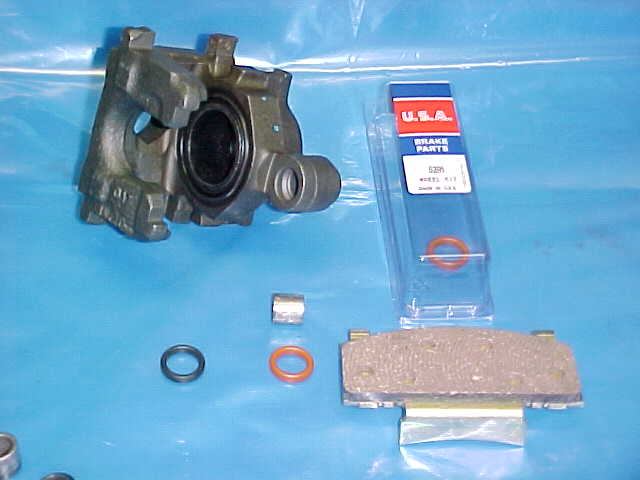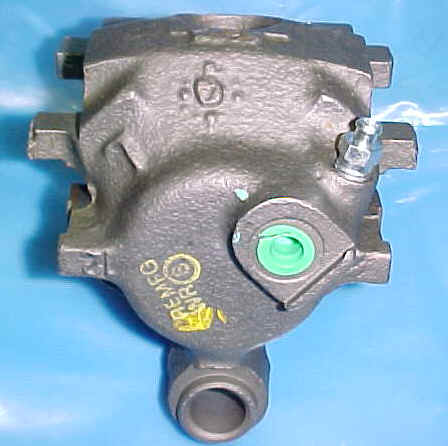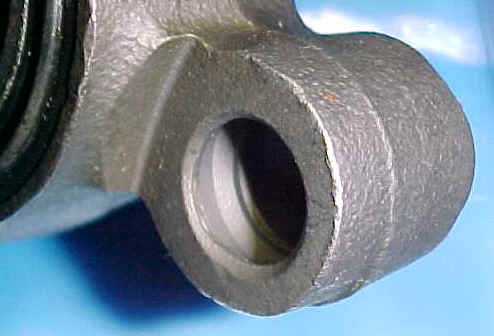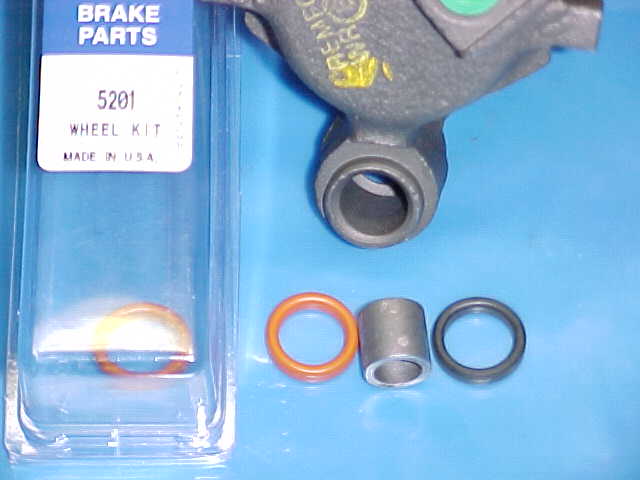
( It doesn't get any more fun than this !! ) (( NOT ! ))
Chevette brakes

( It doesn't get any more fun than this !! ) (( NOT ! ))
Chevette brakes are a subject that causes much mashing of teeth among Chevette owners. I recently spent two weeks, and a lot of unnecessary money "playing" with my '81 Chevette Diesel brakes. My '82 Diesel Chevette has perfect brakes, for some mysterious reason, and I was attempting to get the '81 car comparable. ( I should have left it alone ) If I had just *comprehended* what Alex Quirk had typed on many previous occasions, I would have saved myself a lot of grief, and money.
I think the best advice and information about Chevette brakes can be summed up by Alex Quirk. I have compiled some of his advice to me and others below, and I highly recommend anyone working on Chevette brakes to read and COMPREHEND his sage advice. Now that I have more experience than I ever wanted to have with Chevette brakes, I know that all of Alex's advice and guidance was obviously formed after years of dealing with the Chevette braking system. He knows what works, what to fix, what to modify, and how to deal with this system.
I have added pictures and embellished Alex's wisdom with some hard fought knowledge of my own, and my comments will usually be in green. I will add some more pictures in the future of the caliper assembly on the vehicle.
I really recommend to everyone to flush out ALL old brake fluid as it has a
tendency to get spongy. The moisture and dirt that it holds do a lot of damage to the
system parts...there are probably lots of owners out there that still have most of their
original charge of factory brake fluid...20 YEAR OLD fluid!!
That was one of the best things of the SCCA crowd....
they bled their fluid as a prerequisite to tech inspections...prior to racing at tracks
and hillclimbs...If you didn't change your fluid every year..you didn't race!
As many of GM's small cars they were always experimental to see how small (and Cheap) a
system they could produce...The VEGA had unusual brakes ALSO with a cheap 'ratchet-slide'
adjuster on the rears and cheap plastic slides on the front disc calipers with speednut
retained pins that were always falling off... From '83 - '87 when GM
got back to their normal designs (full size car) the Chevettes brakes were much better. I
still think the best combo is the '76-'82 Master Cylinder(small piston) with the '80-'82
rear brakes(largest piston) and '83-'87 fronts(larger piston..dual slide pins)...
-Make sure that the front pads and rear shoes have useable lining (thickness IS Critical
on the Chevette as they have more limited brake piston travel than most larger cars) on
them...and the hydraulic system (master and wheel cylinders/caliper pistons) are in good
shape with enough fluid in the reservoir and bled of all air..It may be good to flush all
the old fluid out of the system too..Cheap insurance as the whole system only uses a quart
of fluid or so...The old fluid holds a lot of moisture accumulated over the years and is
probably causing internal corrosion of all the components currently as it is likely that
no one ever has changed it...
_________________________ IMPORTANT
!!! ______________________
-Remove the center bolt on the front calipers and get the caliper assembly to move in the
two rubber/metal pads on the spindle mountings...use never-seize to lube the metal
surfaces on the spindle mtgs. and rubber backed metal sleeves..that go on the top and
bottom of caliper assy'.. see picture below.
On the vehicle, there will be some metal sleeves ( not shown ) that ride on the four areas depicted below. It is critical that the caliper be able to slide freely on these metal sleeves.

-It IS likely that you'll find the caliper COCKED off to one side and the outboard pad
(not connected to the piston) not touching the rotor...This is usually 50% of the
problem..as the caliper has to bend at an angle to get contact to the outside
pad...While you're at it lube the sleeve and 'O-ring' ( shown below
) with Never-seize and MAKE SURE the whole assembly slides freely back and forth
across at a right angle to the rotor...


( Note in these photos the caliper housing where the metal
insert goes. It is CRITICAL that the sleeve be free and properly lubed. Note the close up
on the left. That groove is where one of the O-rings goes. MAKE SURE it is cleaned out.
Mine was caked with crud, and was forcing the O-ring too tight against the sleeve, not
allowing the caliper to slide freely. Also, in the picture on the right, I found some
orange silicone O-rings that may work better. )
-The remaining 50% of the problem is in the rear brakes...They use an eccentric cam to
adjust the shoes to the linings..IF..as they normally do..the cams have jammed or loosened
you have to make them maintain a friction adjustment that allows the shoes to come in
contact with the brake drum...it may be necessary to 'work' the adjusters a few times then
operate the brake pedal to get the shoes 'out' to the drum....
-Lastly...One more problem...you NEED the parking brake to be operative...the cables need
to move easily in their sleeves and then you need to adjust the nut on the splitter (under
the driveshaft/rear axle torque tube) to JUST START both rear brakes dragging lightly
while the rear-end is jacked up and then backing off a turn on the nut...all while the
brake handle is fully down on the floor...most of the time that I've adjusted them...they
just barely start to apply the brakes fully pulled up...When you get it right..the handle
will apply the rear brakes at about half that far up...
On the Delco-Moraine self adjusters..backing up activates them and the parking brake
adjustment is a part of the system too.
-It is probably a good thing to release the hand-brake assembly adjuster nut fully and get
the eccentric cams operational FIRST and go out and road-use the brakes until the cams
adjust the rear brakes up...THEN adjust the hand-brake lever nut...
-The '76-'79 Chevette system can be made to work fairly well...but all the things
above...must be kept operational (HIGH maintenance) for them to work at all WELL!!
That is the reason I prefer the second/third gen brake systems ('83-'87) to the earlier
ones..The '80-'82 models had a mix of the newer Delco\Moraine adjuster rears with the OLD
style Single pin front calipers...All this is from 10 years of racing experience with a
couple of different cars.
Alex Quirk
( More Alex brake wisdom )
I did the calculations a while back for someone on the
forum(I think it was
the old forum..another one lost) of the percent multiplication factors
between the standard 49mm '81 calipers with their master cylinder and the
52mm '83-'87 calipers with the small diameter '81 master..and I think it was
around a 60% gain in force at the pad for the same foot pressure..the rears
stay the same but most of your braking is in the front anyway...
.If you want the best brakes...go to the '83-'87 caliper/mounting with all
you other parts as is...It wouldn't be as hard as you think and the change from the
'76-'82 fronts is amazing on an '80-'82 car...if you can find a set of soft
carbon/metallic front shoes to go with it..that makes an even bigger difference...
( This is the change that I look
forward to next summer. I intend to get some 83 and up caliper brackets and calipers, the
ones with TWO SLIDING PINS, NOT ONE STUPID PIN, and bolt them on. Nothing else is
needed, and this change should be dramatic ! I can't stress enough how pitiful the single
sliding pin caliper system is. )
The '76-'82 calipers actually bend apart under a very heavy brake foot(OR with a Power
Brake Booster!)
The difference in pedal feel is amazing..the only thing that it does that is NOT likeable
is that the pedal travel is greater...at about 1/2 way to the floor under a slow
relatively heavy foot you can lock the front brakes....but the pedal is much more
modulate-able than most Chevettes!!
For the first 2 years of AutoX, I wrestled with the old style calipers(they very seldom
stay working well for more than a month at a time) and after looking in a Wagner brake
catalog at specs for all kinds of cars thinking of adapting parts from another GM, I came
upon the upgrade from the newer models to the older....even while I already had an '84
sitting there..The result of the upgrade is that the '81 has better brakes than the '84
with a little less pedal height...the pedal feel is much solider tho'.....and the
modulation is so much better too..as you can feel impending lockup....
The adapter bolts to the spindle with 2 bolts and as far as I know ALL the
spindles/uprights('76-'87) are the same!(I DON'T have a lot of experience with Diesels
tho'!) So the mod just involves getting the caliper and its adapter/spindle mounting....
Too GOOD to be true!!!
There are differences in the disc rotor over the years also and I would lean toward
the newest assembly but as far as I know they all interchange...and bolt on to any
spindle...
here's what I wrote about the subject of the single pin calipers with Shawn..in March
2000..
Two points...
I will still argue in favor of the '80 - '84 rear star wheel
adjusted delco-moraine units in place of the cam adjusted and I
HAVE had both(Many cars! 250,000 -300,000 miles)...
There were actually three generations and I had
forgotten about the '85-'87...although they were basically the
same...the cure for a low pedal on the later units is not hoping
for the friction of the cams to maintain adjustment (MOST didn't)
it is backing the car up more and USING the brakes hard once in a
while...also in both case USE the hand brake OFTEN..to keep the
cable free....and to make either self-adjuster system(cam or star-
wheel) work better...
Second...use DOT 4 fluid NOT DOT 5...Silicone is a NO-NO in a
performance system as it is virtually impossible to extract all
of the air from the material because of the thicker
viscosity...and I had tried this before a driving school...
Lockheed AP550 fluidm, the synthetic Valvoline or even Castrol
LMA are eons better than the brake fluids of 20 years ago..and
also have a low affinity for moisture absorbtion..But if you go
with the recommendations of many racing organizations you will
bleed and refill your entire system every year anyway...If you
don't believe me..just check with the major Race teams..NONE use
Silicone...It has been known to hydro-lock a caliper ON because
of expansion problems of itself and air trapped in it...
If it weren't for those problems..I would love the
stuff...because it protects the parts of the system better...
Alex Quirks web page can be found here.